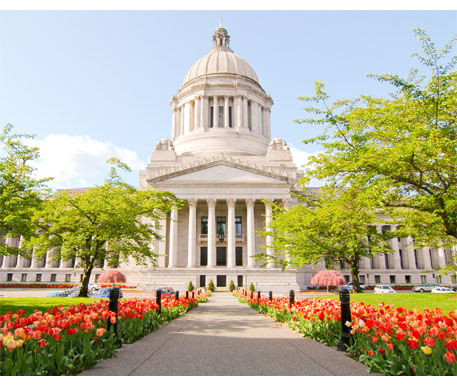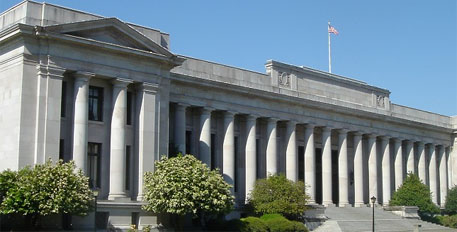OPINION
Public Records Act expands disclosure, but protects privacy
EDITOR’S NOTE — The Washington State Labor Council, AFL-CIO has taken no position on ESB 6617, nor on the disclosure of legislative records in general. The WSLC will continue to advocate at the Legislature on behalf of working families as we always have — clearly, openly, honestly, and tenaciously. The WSLC is posting this opinion column to inform and drive discussion, and not as a matter of advocacy.
By SEN. JAMIE PEDERSEN
OLYMPIA (Feb. 26, 2018) — Washington state legislators have been hearing many concerns regarding ESB 6617, the Legislative Public Records Act. I support ESB 6617 and voted for it last Friday when it passed the Senate by a vote of 41-7. The House also voted to approve the bill on Friday by a vote of 83-14. My understanding is that Governor Jay Inslee intends to let the bill go into effect without his signature, so it will become law this week.
I would like to explain my position, since I think that the bill has been widely misunderstood.
 Since the Public Records Act passed in 1972, the Legislature has consistently maintained that the Legislature is an independent branch of government, not an “agency.” We have, therefore, made our own rules about what documents are public. The judicial branch also takes the position that it is not subject to the Public Records Act and has adopted its own rules.
Since the Public Records Act passed in 1972, the Legislature has consistently maintained that the Legislature is an independent branch of government, not an “agency.” We have, therefore, made our own rules about what documents are public. The judicial branch also takes the position that it is not subject to the Public Records Act and has adopted its own rules.
About a year ago, various media organizations sued, claiming that the Public Records Act should be interpreted to cover the Legislature. Just over four weeks ago, a Thurston County Superior Court judge ruled that although the Legislature is not an agency, individual legislators’ offices are agencies and are subject to the Public Records Act.
This ruling overturns settled law from the last 45 years in this area and produces absurd and unworkable results. For example: I have one full-time staff person. If Judge Chris Lanese’s opinion stood, I would have to appoint my own public records officer; adopt rules for public disclosure in my office through the Washington Administrative Code; and be available at least 30 hours a week year-round for public inspection of records.
So the Legislature has done exactly what Attorney General Bob Ferguson said we should do: change the law to clarify how legislative records should be treated.
The bill does not merely codify the Legislature’s current interpretation of the Public Records Act. It also adds substantial new categories of records (including legislators’ calendars and letters and e-mails from lobbyists) that will be subject to public disclosure. These documents have never been public before. The Legislature will also create a new public records office and has funded several positions in the supplemental budget to staff it. I view these changes as a significant step toward transparency.
The bill does continue to protect certain categories of documents, such as constituent correspondence and the location of meetings on our calendars. I think that these exceptions are balanced and appropriate. I receive 10,000-12,000 e-mails each session from constituents. Many are form e-mails from advocacy groups. Should a marketing firm be allowed to do a records request to my office for everyone who has e-mailed me about gun safety?
Others share very personal information and seek my help in resolving their problems. These range from government benefit issues to sensitive health information to challenging family situations. If constituents knew that their correspondence could wind up on the front page of The Seattle Times, I believe that it would have a significantly chilling effect on the First Amendment right to petition the government for redress of grievances.
With respect to the location of meetings, women legislators have shared concerning stories of being stalked. That would obviously be much easier if anyone could find our locations at particular times well in advance.
I am very skeptical of the claim that lobbyists will “de-register” to avoid disclosure of their correspondence. Our laws regarding lobbying disclosure are thorough and would pick up people who are making regular contacts with us on behalf of employers. We can monitor this and see whether any significant numbers of lobbyist employers stop paying lobbyists. I am not a betting person, but I would be willing to bet that a year from now there are no fewer lobbyists or lobbyist employers than there are now. Remember also that NONE of these records have been previously disclosable so, although this change may not go as far as some open government advocates want, it is a substantial move toward transparency.
 Another concern I have heard is that ESB 6617 does not permit judicial review. The Legislature is a separate branch of government with its own unique issues related to records. The judicial branch made its own rules for what would be disclosable under GR 31 and GR 31.1 and that branch supervises itself. No fees or penalties of any sort are available. The House Executive Rules Committee and the Senate Facilities & Operations Committee are well-positioned to administer this process and handle appeals quickly and efficiently. The meetings of the Senate Facilities & Operations Committee are open to the public.
Another concern I have heard is that ESB 6617 does not permit judicial review. The Legislature is a separate branch of government with its own unique issues related to records. The judicial branch made its own rules for what would be disclosable under GR 31 and GR 31.1 and that branch supervises itself. No fees or penalties of any sort are available. The House Executive Rules Committee and the Senate Facilities & Operations Committee are well-positioned to administer this process and handle appeals quickly and efficiently. The meetings of the Senate Facilities & Operations Committee are open to the public.
Some people have suggested that internal complaints should be public as soon as they have been filed. I have been a member of the Legislative Ethics Board for more than 10 years and have seen how people try to abuse that process to gain points in political campaigns. The basic protection that the Ethics Board has created is that complaints do not become public until the Board has made a determination that there is reasonable cause to believe that a violation of the Ethics in Public Service Act has occurred or has dismissed or otherwise resolved the case. Similarly under ESB 6617, every allegation will result in a final report, once all of the facts have been uncovered. But while the complaint is in process, I believe that it is appropriate to keep the records confidential. I should also note that although the Senate has made these records available previously, the House has not. This is a significant change.
I have also heard concern that the changes to the law will apply only prospectively. ESB 6617 effects a substantial change in the law about what records may become public. It is appropriate to have its effect be prospective only so that people who are communicating with the legislature know what to expect about how their records will be handled. Legislators can also adjust their calendar practices if necessary.
Finally, I must say that I regret that the bill did not have time to go through the regular committee process. That is driven mostly by the fact that Judge Lanese ruled in the middle of the legislative session and refused to stay his decision. By the time our counsel had drafted the bill and had it ready to introduce, we were already past the time when the bill could have been heard in the regular process. If the ruling had come in October, we could have done this differently. But of course this law — like any other — can be amended at any time and I think it is likely that future Legislatures will make revisions to it as we gain more experience with how the new process works.
I strongly encourage you to read the bill’s intent section, which is I think a very crisp and thoughtful statement about why it is appropriate to have a statute crafted specifically for the legislative branch.
 Jamie Pedersen is a Democratic member of the Washington State Senate, representing the 43rd Legislative District in Seattle.
Jamie Pedersen is a Democratic member of the Washington State Senate, representing the 43rd Legislative District in Seattle.





